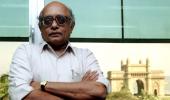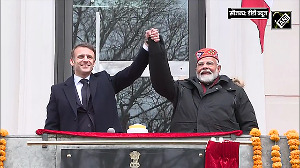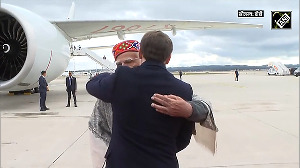'The very fact that his autobiography is called India Rising is a correct example of his wish for India to be a developed country and do as best as possible by science reaching to the common people.'

Dr Rajagopala Chidambaram, who built his own experimental instruments during his initial days in nuclear science, was later instrumental in India building the supercomputer Anupam, recalls Dr K N Vyas, former chairman, Atomic Energy Commission.
"With the help of experts working in computer science -- both hardware and software -- the supercomputer was integrated by scientists at BARC (Bhabha Atomic Research Centre, Trombay)," Dr Vyas says.
The unique thing about Dr Chidambaram, says Dr Vyas, was his faith in Indian capabilities.
"Dr Chidambaram used to feel that India should do better and better. And he always encouraged indigenisation having resilience in the research being done in the country," Dr Vyas tells Rediff.com.
"When he was principal scientific advisor to the Government of India, the focus was on scientific outreach to people at large. He developed the National Knowledge Network to help universities and R&D institutes to interact with each other by networking," says Dr Vyas.
"He laid extreme emphasis to take science to the rural people. He and his office played a big role in that," Dr Vyas remarks.
"The very fact that his autobiography is called India Rising is a correct example of his wish for India to be a developed country and do as best as possible by science reaching to the common people and ultimately be a useful tool for advancement," highlights Dr Vyas.
Dr Chidambaram was an academically brilliant scientist. At the Indian Institute of Science, Bangalore, says Dr Vyas, his thesis was awarded the prize for best thesis.
But in the field of science, academic brilliance is not enough. What is important is the ability of a person to conduct experiments, Dr Vyas adds.
Dr Chidambaram earlier worked in crystallography and was considered one of the best scientists in that field.
"He was the person to start neutron crystallography and made a large number of innovations. He used to build his own instruments and has done pioneering work in this field," remembers Dr Vyas.
"From crystallography he switched over to studies on the equation of state," Dr Vyas adds.
Equation of state is a novel activity which was initiated at BARC. The idea was to measure what happens to the material in case of high levels of shock waves.
This was followed by many other multidisciplinary activities initiated for the first time in India and certainly within BARC, Dr Vyas recalls.
Dr Chidambaram also showed his excellence in the administrative arena.
As chairman of the board of governors at the International Atomic Energy Agency (IAEA), Vienna, Dr Chidambaram was responsible for dispute resolution amongst various countries.
Dr Chidambaram held numerous prestigious roles throughout his illustrious career, including principal scientific adviser to the Government of India (2001 to 2018), director, Bhabha Atomic Research Centre (1990 to 1993), chairman of the Atomic Energy Commission and secretary to the Government of India, department of atomic energy (1993 to 2000).
Venkatachari Jagannathan can be reached at
venkatacharijagannathan@gmail.com











 © 2025
© 2025